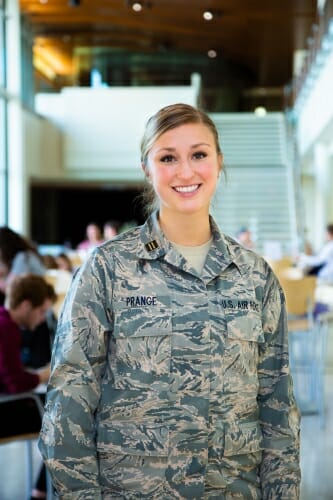Commencement spotlight: ‘Exceptional’ grad to enter Air Force Nurse Corps as one of its youngest members

After juggling nursing school and ROTC training for four years, UW–Madison senior Delora Prange will become one of the youngest members of the U.S. Air Force Nurse Corps this summer. “The School of Nursing has been so amazing in helping me accomplish my goals,” she says. “They were always willing to be flexible if my schedule needed tweaking.” Photo by Alexander André
From a young age, Delora Prange knew she wanted two things from a career: to help people and to see the world. At a high school career fair, she saw a photo of a nurse in a military helicopter and it all clicked.
That vision is now coming true. On May 11, Prange will graduate from UW–Madison with a bachelor’s degree in nursing. A few weeks later, at age 21, she is expected to become one of the youngest members of the U.S. Air Force Nurse Corps.

ROTC cadets wear their uniforms to classes on Tuesdays. “The military taught me how to handle criticism and manage stress,” says Delora Prange. “I learned that I handle my stress best when I act and do things, not sit and lament.” Photo by Alexander André
It’s an uncommon feat. Most members of the Nurse Corps are older because they’ve taken a sequential route: they’ve first earned a nursing degree and then joined the military, or vice versa. Prange did both simultaneously, upping the degree of difficulty considerably. While enrolled at the UW–Madison School of Nursing, Prange has been a cadet in Detachment 925, the campus Air Force Reserve Officer Training Corps (ROTC). She is to enter the Nurse Corps this summer as a second lieutenant.
“It’s exceptional that she’s going straight into the Air Force as a nurse at such a young age,” says Lt. Col. Christina Schmoker, commander of Detachment 925. “She’ll likely be the youngest nurse at her first duty assignment by almost a decade.”
Prange will be stationed at Wright-Patterson Air Force Base near Dayton, Ohio, where she’ll work as a staff nurse in the surgical unit of the base’s medical center. Later, she hopes to become a flight nurse and serve abroad. That’s her adventuresome side.
“I’m not a fan of stagnation and staying in the same place,” she says.
Prange grew up in Nashotah, Wisconsin, about an hour east of Madison. As a student at Arrowhead Union High School in Hartland, she danced ballet, downhill skied and lettered in cross-country all four years.
She’d always been interested in health care and viewed the Nurse Corps as a way to serve military veterans and their families, a population she greatly admires. She’s attending UW–Madison on a full-tuition Air Force ROTC scholarship.
Nationally, the Air Force ROTC commissions several thousand officers each year, of which about 50 are nurses, Schmoker says. The Air Force ROTC program at UW–Madison is demanding, requiring 10 to 12 hours per week, she says. This year, Prange has been the cadet in charge of writing the workout programs for all physical training.
“What sets Delora apart is her humility and maturity,” Schmoker says. “She’s very insightful, has amazing critical-thinking skills, and is very reflective. Despite her youth, she’s fully prepared to be an Air Force nurse because of the great training she’s received through the School of Nursing and Detachment 925.”
Prange says she was a little unsure of how she was doing in ROTC until she earned a spot at officer field training at Alabama’s Maxwell Air Force Base the summer between her sophomore and junior years. It was a big deal to be selected, and once there, she finished in the top 10 percent of cadets as a distinguished graduate.
During the training, she learned that her leadership style emulates what Florence Nightingale said: “How very little can be done under the spirit of fear.”
“I kept everything together, and I didn’t have to be a big yeller to get people to listen to me or to gain their respect,” Prange says. “The military is really shifting toward embracing diversity, and I was relieved to learn that it had a place for me and my leadership style.”
Last summer, Prange interned at the Pentagon, where a mentor gave her the rare opportunity to fly in an F-16. She dry-heaved only twice. “Apparently, that’s a good rate,” she says.
This fall, while working at Wright-Patterson Air Force Base, Prange will begin an online master’s degree program in nursing and health care leadership through Duke University.
The Air Force is very supportive of higher education because it wants well-trained people in decision-making positions, Prange says. She fully intends to be one of them.




